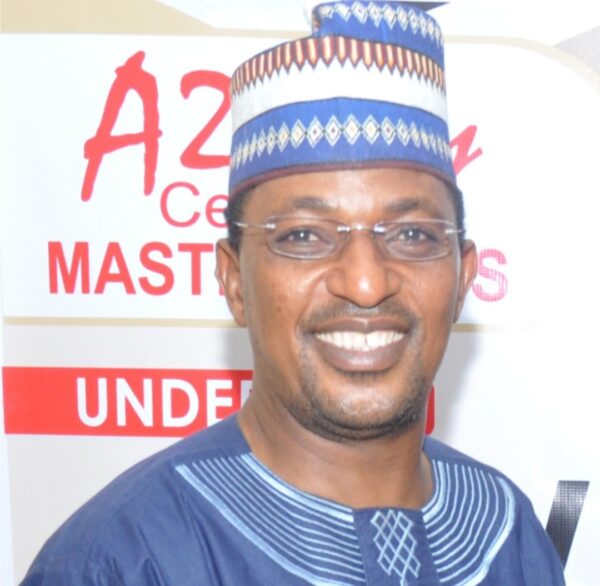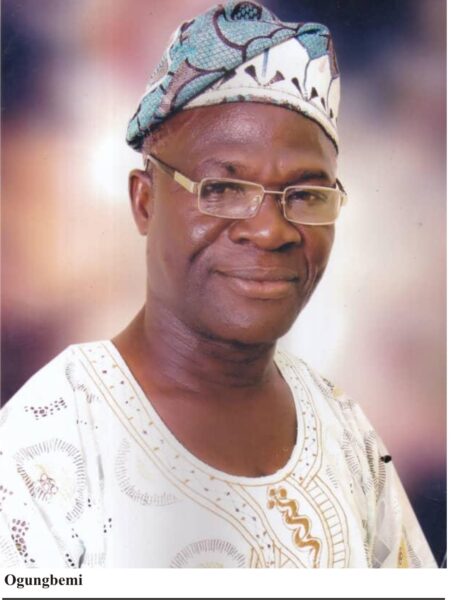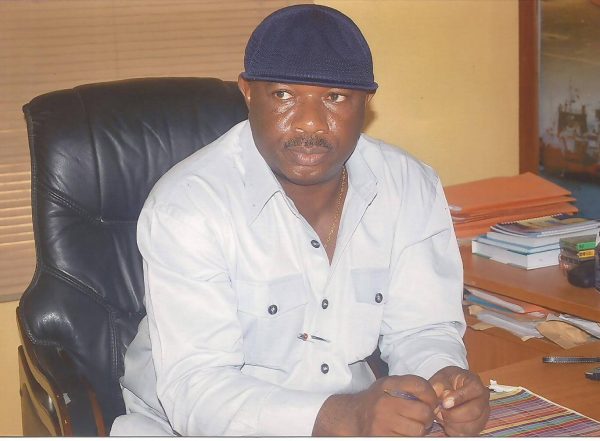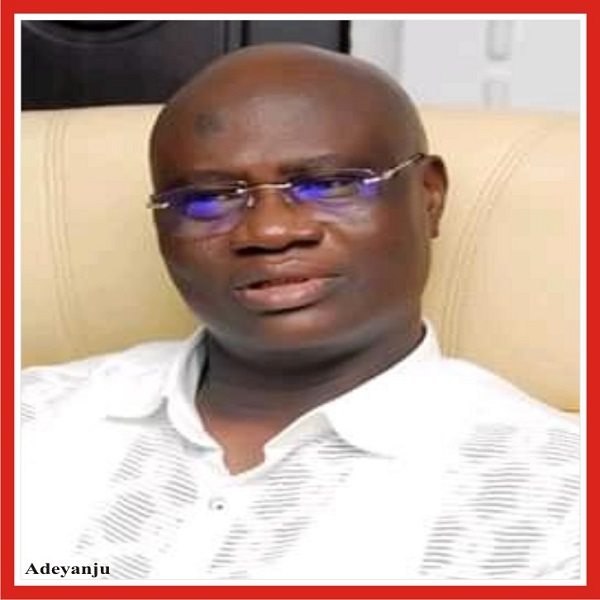Lekki Deep Seaport Is A Disaster In Waiting- Dr.Segun Musa

Dr Olusegun Musa is the Managing Director and Chief Executive Officer(CEO)of Widescope International Nigeria Limited. Former Chairman, National Association of Government Approved Freight Forwarders (NAGAFF),Murtala Muhammed Airport Chapter. A well- rounded freight forwarder who has seen it all as far as the maritime industry is concerned. Therefore,when he speaks on any issue in the industry,he speaks with the air of knowledge and authority. In this interview,touched on so many trending issues in the industry,bringing new insights and flavour into any discourse. Why is the famed Lekki Deep Seaport a failed project and a disaster in the waiting? What were his views on the customs modernisation project and the restive issue of VIN valuation.He spoke with Frank Odinukaeze. Excerpts
18 years after the establishment of the Cabotage Vessel Financing Fund (CVFF)ship owners are yet to get any money from the fund.What is your take on this?
Thank you. First and foremost, it is sad that Nigeria government decided to venture into and politicize the core public center of the country. What do I mean by this? By the time you bring on board a non professional, say a politician to be the head of a ministry,that is very important,definitely you have politicized that ministry.And that’s why we are where we are today. I was lucky to have met the former Minister of Transport,Rotimi Amaechi,twice and the same question you asked me was put to him.He couldn’t give any relevant response. And I can bet you without mincing words that the money is not in the Central Bank of Nigeria.(CBN).It has been shared. If the money is in the CBN,and it is doing nothing in CBN, they would have utilized it .The money is meant to be utilized , especially for indigenous ship owners that are willing to increase the national fleet and also allow us to participate in the shares of cargo, both inflow and outflow. And perhaps you also remember in the days of National Maritime Authority (NMA),now Nigerian Maritime Administration and Safety Agency ( NIMASA).We were able to have ship building and ship acquisition funds. The argument then was that people collect the fund and they divert the money. But we were able to convince government that the modus operandi of distributing and giving the fund was faulty.And that was why people were able to divert this fund. Because if you are giving the fund to people that did not even have any experience and you expect them to return or pay back ,you won’t get that. But the argument of government then according to the minister was that the government was not convinced that we have indigenous ship owners that are ready to buy or that have the capacity to manage such fleet which also was wrong.Amaechi in his usual character, takes things with levity. As at the time, he wanted to start implementing the disbursement of the fund he discovered the fund was no where to be found. Perhaps, that was what led to the crisis between him and the Minister of Finance, over the sharing of the fund. The Minister of Finance was saying governments was not ready to share while Amaechi was saying that government was ready to share. So the money was not there, that’s what it simply means.
Talking about the Minister of Finance ,Zainab Ahmed,she once said that the Cabotage fund was government’s money.Who actually owns the fund? We understand that this is accruals from ship owners?
People need to know the source of the money. The fund itself was borne out of government domination of the shipping industry. And the indigenous ship owners were unable to compete with government. After a lot of consultations, there was a truce. There was an agreement between the private sector and the government. Let us be contributing to a pool ,whichever vessel that comes in ,both indigenous vessel and foreign vessel, should also contribute to the pool. And this pool should be used to develop our local capacity for effective participation. That was how ship building funds emanated. So ,if anyone says the money belongs to government, it is a lie.
Government is only a custodian for proper disbursement. It is just a custodian, to keep the fund from the pool to ensure that disbursement is justified. That is just the role of government. But the money belongs to the indigenous ship owners.
Talking about the role of government in the fund,we understand that the original intention of the fund was to help in capacity building in terms of developing the local ship industry. But 18 years after, the fund has not been disbursed. As a professional and industry player what advice would you give to the ship owners in this circumstance?
Well, there is no advice because there is no bank that is ready or willing now to finance ship acquisition because it is capital intensive. So the banks can’t do it and that’s what prompted those ship owners of those days to have local discussion with NMA,and the Federal Government. There was an agreement to set aside pool that will support local capacity building. In any part of the world, government plays a critical role by creating a foundation that will improve ship owners performance as well as ship acquisition. So, if government is unable to do this,it simply means that government has failed.
And you can imagine quantifying what we have lost for not participating in this shipping business.
A lot of people had expected that NIMASA,would have intervened in this matter because it once promised to do something concerning disbursement of the CVFF fund, but till now nothing has come out of NIMASA. What do you say to that?
Well,I will rather say that government is blurred by appointment, they have more political participation in critical appointments. This is what you should expect .But ordinarily, management of NIMASA, would have been able to present strong case or position to the Federal Government to know the impact of not supporting indigenous capacity. So that government can know how important it is. You remember we lost seat, category C election at International Maritime Organisation (IMO) that we contested for recently. And these are some of the reasons why we lost .We lost because we aren’t critical player in the shipping industry. You must be a critical player for you to earn a seat and for you to earn solidarity among shipping operators of the world. So,if you are not a player,you are not a player. Both government and the private sector are not participating and they are not playing any role..So what else do expect?It’s quite difficult for you to join a club or mobilize a club that you don’t belong to get solidarity or any support.
One of the reasons why the Cabotage issues have lingered and ship owners have not been able to access the CVFF is as a result of them not speaking with one voice. There is also in fighting among the ship owners. What should be their collective effort now?
To me ,I don’t believe in that. There is what is called freedom of association. Everybody has the right to belong to where he or she feels like belonging. It is just like somebody saying because there is no unity between NAGAFF and ANLCA, that’s why government is not giving attention to the freight forwarding industry. This is not true. In a society where you have freedom of association, you only need to engage in individual interest, according to the way they presented it to you. So,for them not to be speaking with one voice, does not stop government from playing their role. If the banks are not speaking with one voice will CBN be shut down? No! That’s not the way it goes. The major thing is that they are all presenting their demands from different ways. But that does not stop government from doing the needful.
The right thing to do is to look at the qualification for the fund to be granted,and the next thing is to have an agreement, how it would be paid back .So,not speaking with one voice is not an excuse for any government not to have played their role when they have the fund that belongs to the public kept in their custody.
NIMASA is yet to remove any weeks,nine months after an elaborate ceremony.What is your take on this?
You remember the jamboree that took place recently,that Mr.Presedent came to commission the deep blue project. Even before the commissioning, I granted an interview,and I told people that this is an effort in futility. And it’s nothing more than a fraud. And that’s what we are experiencing now. Some of them have even said that it is a failed project. If it is a failed project,who proposed it? Somebody should be languishing in jail by now. But we live in a country where whenever anybody promotes any policy and it fails and government loses money,the nation loses money,they still go around celebrating, receiving awards.It is a shame! I expect that by now somebody should be in jail for that failed project because the money does not belong to them. The money belongs to Nigerians. And for somebody to have squandered and wasted our money, that person should be in jail by now.
The wreck is a major challenge. We have so many wrecks here and there.And NIMASA is not even willing to remove them. Because there is no sign that they are even willing to remove them. They will only display interest and after the interest is captured by people,that’s the last you’ll hear about it .And the wrecks are hindering a lot of shipping activities as we speak.
You talked about the Lekki Deep Sea Port Project is there with evacuation limitations and other challenges even from infancy, the existing ones, for instance, Lagos ports which was recently ranked very low,358 out 370 assessed globally, with dilapidating quay apron. What can you say about this culture of laxity even for a brand new port?
I am one of the advocates of developing more ports in the country. As at the time we developed Apapa ports,that wasin the era of oil boom in Nigeria. And at that time, with over flow of activities Tin Can Island Port was opened as lighter terminal.
Tin Can Island Port used to be a lighter terminal just like Brawal, then. So the excess cargo that could not be accommodated in Apapa ports were barged to Tin can Island Port.
Tin can Island was not established as a full port .It was meant to accommodate excess cargo that cannot go to Apapa.And now the economy has expanded to the level that our import and export have increased. And that’s why we begins to see congestion every where coupled with the fact that manufacturers were also allowed to open factories inside the port.The port that was getting choked up already,you now brought in manufacturers to occupy a major chunk of the port. So the need for new ports became inevitable, and we had to propose to government that there is need to for us to have lighter terminal in different corridors and deep sea ports.And the deep sea port in Lekki and that of Badagry are private sector driven. They are not government port. .And there is a lot of politics associated with it .Lagos State claim to be the brain behind it, while the federal government is looking at that of Badagry.But Badagry is not moving at the pace of Lekki.So the federal government now rushed back to Lekki . Unfortunately,the corridor of Lekki is going to be a disaster very soon.
That corridor is going to be a disaster, because of the way it is designed,just the same way we had it at Tin Can .Tin can was not designed to be a major sea port.Lekki was not opened up to be a major deep sea port .So it’s going to be a future disaster.With the style of port we are bringing in there,unless we have to quickly open up the place, with feeders to the seaport, so that we can deploy more barges operations than haulage within that corridor, otherwise it will be a future disaster
What is your assessment of the VIN Valuation?What impact will it have generally on the economy and the masses?
To me,I have said at different fora that VIN valuation decision is an intellectual fraud, intellectual fraud in the sense that the concept in itself is faulty.
If the concept is not faulty from the beginning,there won’t be need for them to suspend and go back to the board and start redesigning and trying to pad and pad .It is a project of intellectual fraud.
If government had informed Nigerians on the need for us to automate the system, I expect that VIN should have been captured in that automation system, rather for them having automated system project and all those valuation propaganda. To me, it is an intellectual fraud. And we still don’t know what would be the start of VIN,by the time the system is fully automated whether it would be integrated into the automation or the designer of the automation will have to design something else outside that VIN. But ordinarily, government should not be interested in jerkin up the price of buying fairly used vehicles or Tokunbo because to promotes smuggling. If the vehicle are expensive, people will use the alternative to bring in vehicles, because it has become food for smugglers.Smugglers don’t go for commodities that are cheap in the market. They go for commodities that are very expensive.So,it’s just a way for customs to continue to have more vehicles for auction. I think that’s the essence of the VIN. So that they can continue to arrest more smugglers and more smugglers will be making more effort to improve their tactics of smuggling vehicles into Nigeria.
The E-Customs project is estimated to generate $176bn in 20 years how realistic and sustainable is this project?
Very,very realistic.Intrestingly,I am one of the promoters of that project.I have been on it for quite some time. It is only in some underdeveloped countries like ours that you still see this kind of stone age customs we are practicing here. You don’t see customs eye ball to eye ball as a freight forwarder, unless on some circumstances.You also remember that
there have been occasions when customs accused freight forwarders of fraudulence. They we are dubious;that we are of questionable characters. And we said fine, we don’t want to be anymore. We don’t want to interface with customs again. Let all our interactions be online. And that was what prompted us to propose to government to have not customs alone,it includes the shipping lines,the terminal operators, everything will be done online.
The first phase is Customs. Simultaneously, we will start with shipping terminals as well. But, modus operandi is when this platform is designed,it will be managed by the designers. And customs are not going to be thrown into the garbage.They will also be there,to monitor how it operates,so that in future they will not manipulate it.
There is going to be serious reprisal factors in place for any officer that derails this project.
Because it is our baby,and what we designed and what we did is that by the time you sit in your comfort zone within or outside Nigeria,you can access the platform.You put your data there ,you make your online payment, as the containers are landing,they are going through scanning.
The report of the scanning would be imputed in the system attached to the manifest.By the time you make your payment, they will look at what you declared and what have been carried as report. If there is discrepancy, they might invite you for joint examination. If it corresponds, they will give you express release.They will now send you a code .They call it Release code, which will be sent into the phone number you provided when you are capturing and the E-mail also. After they send you the code, they will also send the code to the terminal where the cargo is.
Thereafter, you go to the shipping company platform, you give them your release code.They will give you your Delivery Order(DO)which you fill online and then submit. They will give you shipping company release code. As they are giving you code they are also dispatching to terminal operator’s platform online. You present your DO, if it corresponds with what the shipping company has given them online,and the release code,customs has given you also is the same with what customs gave them,just pay the terminal charges online.They will give you what we call T.D.O.C.-that is Terminal Delivery Order Code.This represents your T.D.O.That is what you give to your haulage.They will take the code to the port to effect delivery of their cargo.
,







